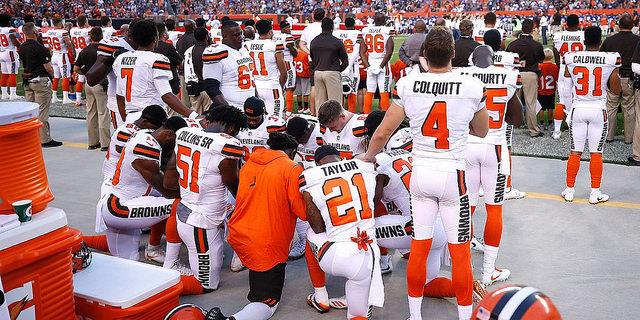In a way that’s only possible in 2017 American politics, the President of the United States embarrassingly took aim at members of the NBA and the NFL. On Friday night, during a campaign rally, Trump attacked professional football players, calling those who have decided to kneel during the national anthem “sons of bitches.”
These players have been kneeling in an act of solidarity, protesting the extrajudicial murder of people of color carried out by the hands of racist and tyrannical cops. The act, originally started by Colin Kaepernick, has been a topic of contention for months.
The next morning, Trump continued his incoherent tirade, and turned his attention to the Golden State Warriors, rescinding the invitation for the team to visit the White House, after Stephen Curry announced he would not visit.
In response to Trump’s remarks, the proverbial floodgates opened, and professional athlete’s vitriol and grievances freely spilled towards the President. LeBron James, of the Cleveland Cavaliers, called Trump a “bum”, sparking heated debate from pundits on each side.
Tensions had been building in the world of sport, as earlier in the week, Trump demanded ESPN reporter, Jemele Hill be fired after calling Trump a white supremacist. Comments that are not even close to being wrong. For this is the same president who has wavered numerous times on condemning the atrocious actions of white supremacists and has blamed “both sides” for far-right violence.
All eyes were focused on how NFL players would react on Sunday, following Trump’s latest act of bigotry. En masse, dozens of players kneeled in solidarity with Kaepernick’s protest, with whole teams abstaining from taking part in the anthem. In other acts of solidarity to their fellow professional athletes, many continued posting to social media. Aaron Rodgers, of the Packers, posted a photo of him and teammates kneeling, signaling unity and support. However, as more players began partaking, the message seemed to be shifting.
As more players knelt, political commentators and average twitter-goers alike, began subconsciously changing the narrative and co-opting it into some abstract symbol of opposition toward the Trump presidency.
Taking a knee is not a broader form of dissent; it’s not something that should be co-opted by others to serve a different purpose; it’s not something that should be whitewashed. By broadening the meaning of kneeling, the strength of the message gets lost. A message that should not be ignored.
Taking a knee is about fighting back against police brutality. It’s about standing against the systemic and institutional racism which plagues this country.
Taking a knee is to remember Terence Crutcher, Tamir Rice, Freddie Gray, Michael Brown, Philando Castile, Eric Garner, Trayvon Martin, and countless others who have died at the hands of the police.
Taking a knee is to fight back against the fact that a black person is 3 times more likely to be killed by police than their white counter parts.
Taking a knee is to fight back against the fact 99 percent of shootings result in no conviction — no justice, no peace.
Taking a knee is for supporting Black Lives Matter, not for a broader objection to Trump. As white people, we need to fight against this racism. It’s necessary for white athletes to use their privilege in solidarity, and support movements led by people of color.
Taking a knee represents something that’s more important than any distraction Trump or his twitter account provide.
Adam Ramer (ramer.adam@gmail.com) is a junior majoring in political science and history.


